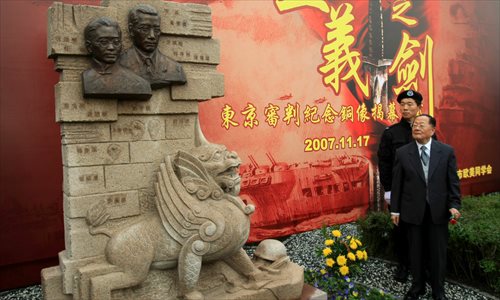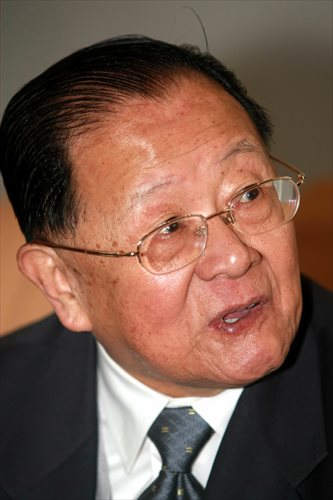Gao Wenbin looks back on his experience at Tokyo Trials

A sculpture to commemorate the work of Chinese prosecutors at the Tokyo Trials was built in Shanghai in 2007.

Gao Wenbin was an assistant prosecutor during the Tokyo Trials. Photos: CFP
Ever since childhood, he was called "a tough guy." At the age of 95, Gao Wenbin is still tough, and has the bearing of an athlete.
He is the only living member of the 17-member delegation of Chinese judges and prosecutors who represented China at the trial of Japanese war criminals at the International Military Tribunal for the Far East, known as the Tokyo Trials.
The Tokyo Trials were convened from May 3, 1946, to November 12, 1948.
Gao's bookshelves in his Shanghai home are full of books related to the trial and World War II. But he knows the facts of the war by heart.
Gao was born in 1920 to a typical family in Shanghai. He studied at the Soochow University Law School, then China's foremost law school.
In May 1946, he boarded a US military aircraft and embarked on a journey that would have a huge significance for his life and China.
As a young assistant prosecutor, Gao was energetic. Each morning, he walked into the Chinese prosecutor's office of the military tribunal in Tokyo to read transcripts of the trial.
Gruesome evidence
Day and night, together with Chinese prosecutor Xiang Zhejun, Gao vigorously helped collect and translate oral and material evidence found in China. The Nanjing Massacre alone had thousands of pieces of solid evidence.
Moreover, Chinese prosecutors persuaded the court to open the internal archives of Japanese ministries, where key evidence of Japanese government war orders and confidential military documents were found. The trials had heard testimonies from 419 witnesses, admitting 4,336 exhibits including depositions and affidavits from 779 other individuals.
Gao found one key piece of evidence by himself. When he read a Japanese newspaper published in 1937, he discovered an article with a photo that described two Japanese soldiers claiming to play a "killing game" in Nanjing. The two claimed that they had killed 211 Nanjing citizens.
Gao immediately mailed the newspaper to the government. The Chinese government asked the Allied forces headquarters to arrest the two. After the trial, the two killers were sentenced to death.
Wall of defense
At the Tokyo Trials, there was a huge team for the Japanese defendants. As well as Japanese lawyers, the court also assigned American lawyers to the defendants on the grounds that they didn't know the American legal system, which was used during the trials. There were more than 100 Japanese lawyers and 40 American lawyers serving around 20 defendants.
The debates at the court were fierce. China faced unprecedented difficulties and pressure. However, almost 70 years later, there are still a few people who claimed the result of Tokyo Trials was merely "victor's justice."
"Such an opinion is totally wrong. The trials were based on solid evidence. The evidence proved they were guilty," said Gao.
During the Tokyo Trials, 818 trials were held, 48,000 pages of trial records were compiled, and final verdicts reached 1,200 pages. It took the court seven days to read the verdicts.
When recalling the Tokyo Trials, his spirit rises, his back straightens and his voice gets louder, though his memory lapses a little.
"Many times, when I close my eyes, there are hundreds of thousands of pieces of evidence I translated laying before me," he said. "These are the blood and tears of the victims. History will never forget. Never!"
The trials saw formal charges filed against 28 Japanese class A war criminals, including former prime minister Hideki Tojo. Six of the accused, including Tojo, were sentenced to death.
Returning home
After the trials, Gao went back to Shanghai in 1948. He was assigned a job as commissioner of the national government. After 1949, Gao continued to work in external relations at the Shanghai government, under the Communist Party of China.
Even though Gao doesn't have a party affiliation, his connection to the Kuomintang (KMT) got him in trouble.
In December 1950, his previous superior officer, who belonged to the KMT, was accused of being a spy and arrested. Gao was also arrested for the same charge, even though he was innocent.
"When I was arrested, I had just been married for several months. My daughter was just born. I had to get divorced, and lost everything," he said. Gao was imprisoned in Shanghai and Jiangsu Province for three years, and was later sent to a labor camp in Jiangxi Province for 26 years.
In the winter of 1979, an old man who looked like a beggar showed up at Shanghai railway station. It was Gao. After an introduction from a friend, he got a teaching post at the Shanghai Maritime College, where he started his new life. The government offered compensation for his wrongful imprisonment, but he rejected.
He began seeing a woman, and dated her for seven years. In 1990, days before he left for the United States for a visiting professor position at University of California Hastings College of Law, they were married. Four months later, while he was teaching in the US, his wife died in Shanghai.
When speaking of his wife, Gao suddenly started trembling, and with shaking hands and tears in his eyes, he said: "We had dated for seven years. I had waited for so long for this marriage," he said, "Since [her death], I haven't thought of marriage again."
Looking back at his life, Gao wishes more Japanese people knew about the Tokyo Trial and World War II.
"If people refuse to assess history honestly, history will remain terrible," he said.
Newspaper headline: Memories of justice